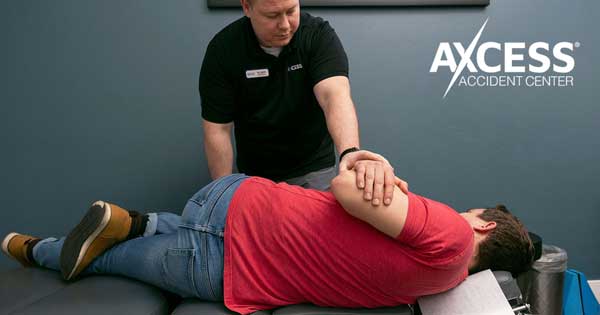What is whiplash?
Whiplash is known as injury to the neck due to a sudden distortion or extension of the neck when the neck experiences a sudden acceleration-deceleration motion. Muscles in the neck and back are overextended and can lead to symptoms from mild to severe pain from stiffness and inflammation in muscles, tendons, joints, and ligaments. Headaches, migraines, fatigue, dizziness can lead to an overall feeling of being unwell. Whiplash is one of the most common injuries in a car accident. There are varying degrees of whiplash injuries but all injuries should be evaluated and treated by one of Axcess Accident Center’s professional chiropractors.
How do I know if I have whiplash or if my neck is stiff?
The simple answer is, you don’t. It’s possible that your neck is just stiff but stiffness in your neck is a common sign of whiplash. Much like a square is a rectangle but the reverse is not true, having a stiff neck could mean that you have whiplash but it is not conclusive. A stiff neck could also be a result of bad posture or driving for long periods of time.
Regardless, whiplash always comes from a violent and sudden movement of the neck muscles (usually in a car crash) and should be treated by a chiropractor as soon as symptoms start appearing. Neck stiffness is not as serious as whiplash but, as they can be next to impossible to differentiate between, you should seek chiropractic care if you’re experiencing either one.
What are the symptoms?
After a car accident, you should be evaluated by a chiropractor as soon as possible. You may not know if you have whiplash because the signs may not appear immediately. Most patients start showing signs after a couple of hours or even days after the accident.
Whiplash symptoms include:
- stiffness of neck
- limited motion of the neck
- dizziness
- headache
- irritability
- disturbed sleep
- fatigue
- shoulder and back pain
- blurred vision
- depression
People with whiplash often ignore their symptoms because of the lack of understanding of their condition. While it is true that some cases of whiplash can resolve on their own, you should not rely on this. More severe cases of whiplash can limit your quality of life. We encourage you to book a free consultation with an Axcess chiropractor if you are experiencing any of these symptoms after a car accident.
How do people get whiplash?
Whiplash is usually the result of being rear-ended or hit at a high speed. However, whiplash can also happen with injuries related to horseback riding, bicycles, snowboarding, or falling from a higher level such as a stool, or even shaken baby syndrome. Whenever the neck is violently overextended, whiplash will usually occur.
How to treat whiplash?
Axcess Accident Center has many treatment methods in our integrative approach including chiropractic adjustments, massage therapy, decompression therapy, and rehabilitation therapy. However, there are some things that you can do at home to help treat your whiplash.
These include:
- Rest. It is important to take some time to relax. Your neck muscles are under a lot of strain throughout the day and it is good to give them some time to heal. However, you shouldn’t overdo it. There is no reason to stop being active as long as you take it easy while doing so.
- Ice and/or heat. For the first couple of days, ice and heat can be applied alternately to help reduce any swelling and even some of the pain.
- Over the counter painkillers. This is not a cure but if the whiplash gets too painful, over the counter painkillers could ease or mask your pain. They should be taken as directed on the label and not as a replacement for treatment.
How long should I wait to get treatment for whiplash?
You shouldn’t wait. The best time to be treated for whiplash is right after an accident. Humans have a history of working through their pain or “walking it off.” This is a bad strategy. The initial injury is usually accompanied by acute pain but if the acute pain doesn’t get proper attention, it can quickly become chronic pain. This is a lot harder to treat than acute pain so you should see a chiropractor as soon as you can after an accident.
How long does it take to heal whiplash?
The healing process depends on a lot of different variables. Everyone heals at a different pace and this is also dependent on how severe your injuries are. Treatment can also vary based on how long you waited to seek care. Chronic pain takes longer to treat than acute pain. Considering Axcess Accident Center’s integrative approach, treatment length can be difficult to estimate except case by case. For a more specific estimate, book a free consultation with our chiropractors today!
Are there long term impacts & symptoms of whiplash?
There are long-term symptoms of whiplash only in patients who have not been treated for their whiplash. Those who neglect their body and choose to work through their pain might experience:
- chronic pain and stiffness in the neck and shoulders;
- upper or lower back pain;
- severe, chronic headaches;
- jaw pain;
- numbness, weakness, or sensory symptoms in the hands, arms, or legs;
- blurry vision;
- difficulty sleeping;
Patients who treat their whiplash immediately after an accident can avoid these miserable conditions. No one wants to live with pain. Long-term effects of whiplash can be avoided if you seek treatment right away.
Conclusion
Whiplash is an injury that should be treated quickly in order to get the best results. When left untreated, whiplash can result in chronic pain as well as other uncomfortable, long-term symptoms. After an accident, it is important to be checked for signs of whiplash even if you don’t feel any pain.
Consult with an Axcess chiropractor as soon as possible and get the help you need after an accident. Contact us today through our website or by calling (801) 701-8222.





